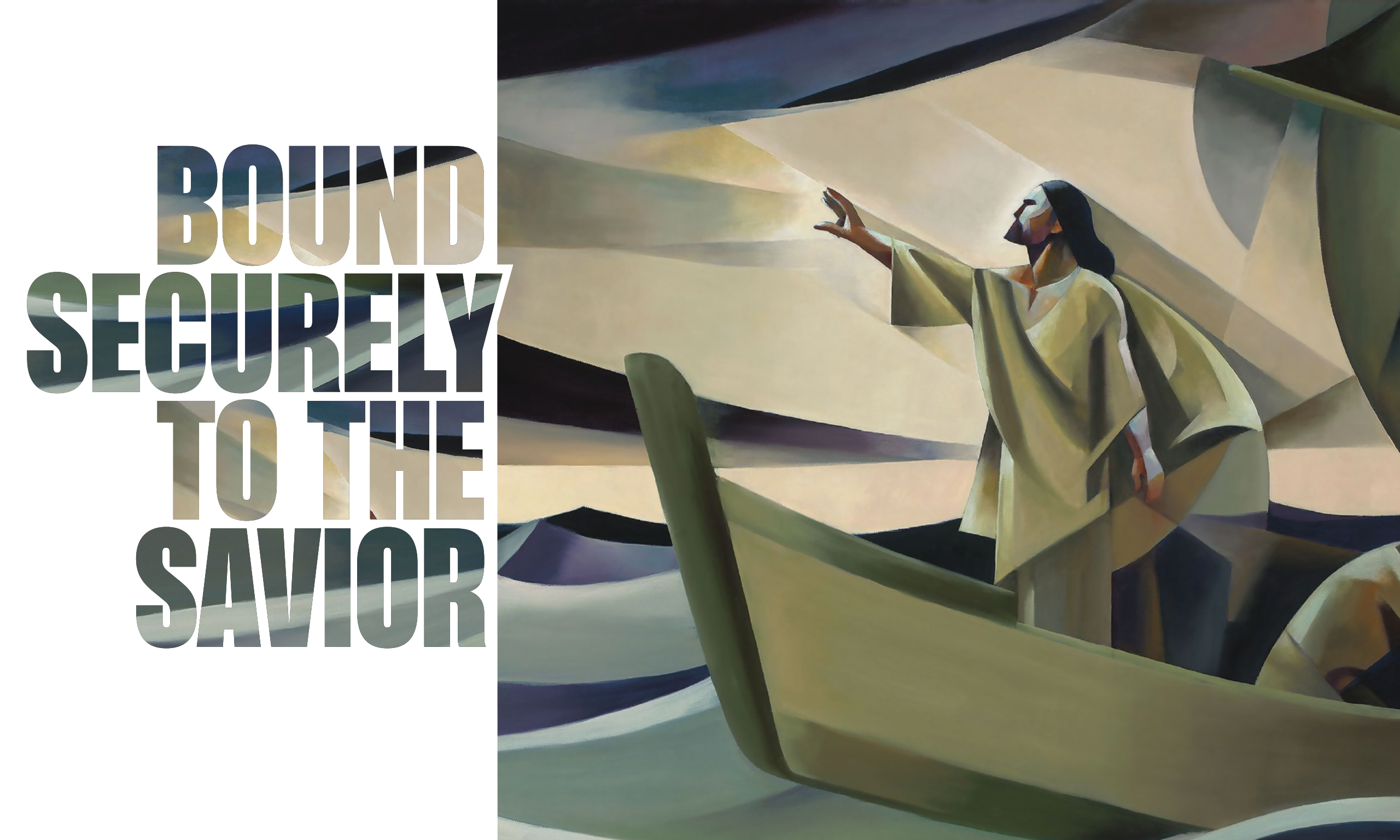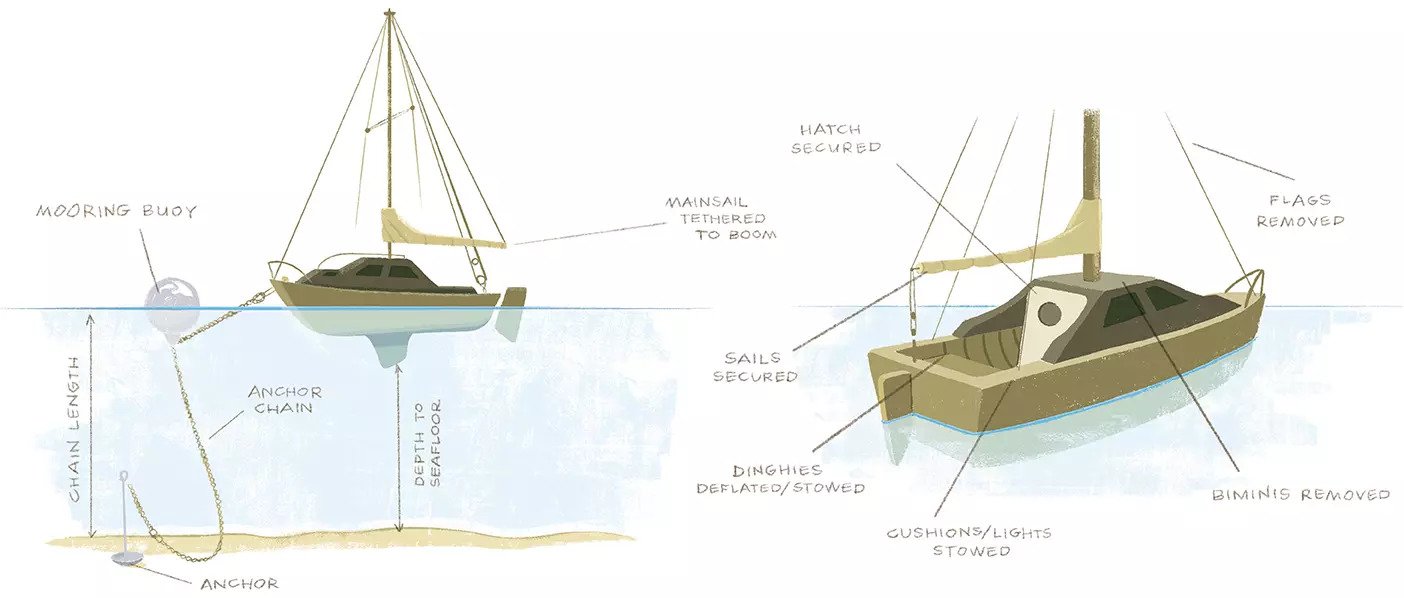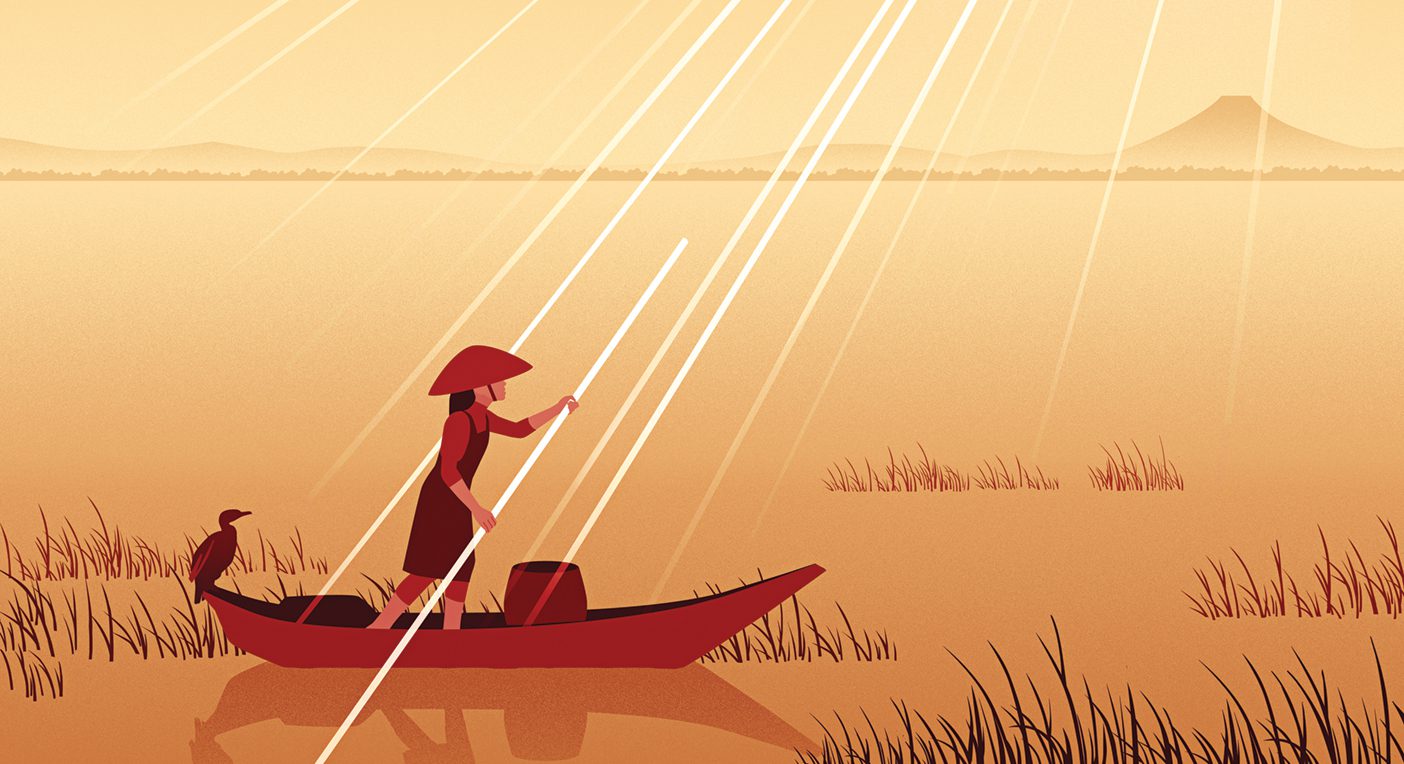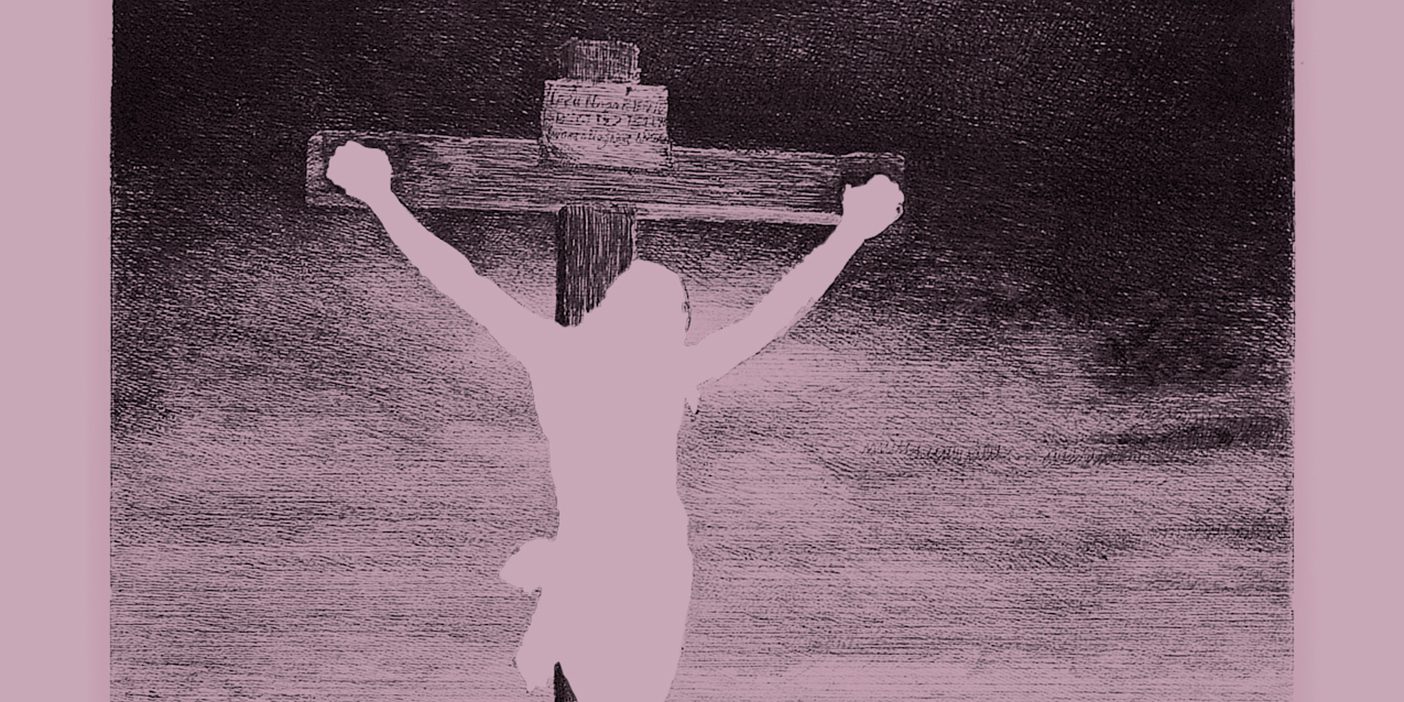Bound Securely to the Savior

Your relationship with Him can anchor you in life’s storms.
By Camille N. Johnson in the Spring 2022 Issue
Header Artwork: Jorge Cocco Santángelo, La Tempestad—Paz, Cálmense, 2016, oil on canvas, 30″x40.”
On Dec. 3, 2021, a winter-weather system known as a Kona low prompted emergency alerts throughout the Hawaiian Islands. That’s right—Hawaii had a blizzard warning.
Strong winds with gusts up to 80 miles per hour were recorded atop Mauna Kea, a 14,000-foot peak on which a foot of snow fell. Lower elevations saw winds of more than 50 miles per hour. And the rains were heavy: Maui reported rain at a pace of one inch per hour, with “near-shore waves of up to 30 feet.”1
Imagine yourself the owner of a boat moored just off the coast of Maui on Dec. 3—what would you do to protect your boat? Of course you would check to make sure that your boat was securely attached to the mooring buoy, which is secured to an anchor on the sea bottom, or to the dock. Also very important to protecting your boat is to remove windage—essentially, removing anything that the wind can grab.
Reducing windage is key to lessening the stress on the boat and on its attachment points to the mooring buoy or dock so that the boat remains secure. So sails must be secured, bimini tops removed, inflatable dinghies deflated and tied down. Flags, cushions, lights—everything that can be removed or lashed down should be to reduce windage.
Do you have personal windage you need to remove in your life? Do you need to reduce resistance so that you may weather the storms that are inevitably coming or bearing down on you now? Eliminating windage reduces load on the attachment point. And to what should you be attached—what is your dock, your mooring, your anchor?
It is your relationship with the Savior Jesus Christ. As Elder Jeffrey R. Holland (BS ’65, MA ’66) has so beautifully expressed:
The Savior is steady, sure, and rock solid. He is an anchor that is never displaced. He is a mooring buoy that doesn’t dislodge. He is an immovable dock. It is we who detach from the rock, the anchor, the buoy, or the dock when we let windage take us and carry us away.
Are there things on your metaphorical boat creating windage, or resistance, to your attachment to Him? What is keeping you from being bound securely to the Savior? Let me describe the dinghies I am trying to deflate, the sails I am trying to secure, and the cushions I am tossing off my personal ship to stay securely bound to the Savior. Perhaps as I work through these, inspiration about your own sources of windage will come to you.

Trust in the Lord

First, worrying about the future instead of trusting in the Lord or waiting too long to turn things over to Him can be a source of windage that strains our connection to the Savior.
I am a consummate planner. I love a good calendar with big boxes that I can write in, and I keep an electronic calendar too.
When I was 16, I received my patriarchal blessing. It was a beautiful and sacred opportunity, a blessing specific to me upon which I have relied and trusted for more than 40 years now. I had hoped, and frankly at age 16 expected, to have some specifics revealed to me, just as had my mother, who was told in her patriarchal blessing that she had the natural attributes of a nurse. My blessing, however, didn’t say anything about what I might study or if I should pursue a professional path. And so I studied what came naturally to me, and I graduated with a degree in English. And then I wondered what to do next.
Of course, given my personality, I wanted a plan; I wanted to have “next steps.” But nothing came to me clearly, so I took a step forward in faith and accepted a job in Washington, D.C. I hatched a plan to take the LSAT while I was there, and later I was accepted to law school. I met my husband, Doug, while I was in my first year, and we were sealed in the Salt Lake Temple. He had his degree and was working. I kept studying and graduated from law school in 1989, and I started working as a lawyer at a well-established Salt Lake City firm.
During the course of my professional life, I had three sons—the bright lights in my life! Family always was, and is, my priority. My husband and I served in many Church callings. We raised our family in the gospel. We worked hard. We loved each other. We worked through personal storms together as a family. And for many reasons, I kept practicing law until Doug and I were called to be mission leaders in the Peru Arequipa Mission in 2016. I returned to practicing law and being a grammy when we came back to Salt Lake City in 2019. With my present calling, I have retired from the practice of law—at least for the next five years.
Why share my bio? To express my testimony that my life plan was rolled out for me as I lived it, keeping my eye on the prize of eternal life. My patriarchal blessing didn’t tell me what to study, no angel suggested the practice of law, and no vision told me Doug Johnson was who I should marry. Yes, I would have liked for it all to have been spelled out for me. But it wasn’t. Instead, the Lord trusted me, and, what is more important, I trusted in the Lord and just kept taking steps forward, believing that if I was off course, the Lord would redirect me.
And as it turns out, there has been joy in the journey as I have gained confidence in my Savior, Jesus Christ, to write my story with me. As I trust more and resist less, I feel bound more securely to the Savior.
“Are there things on your metaphorical boat creating windage, or resistance, to your attachment to Him? What is keeping you from being bound securely to the Savior?” —Camille N. Johnson
Repent Daily
A second potential source of windage is failure to employ the joyful gift of daily repentance. Sin, as it turns out, puts an undesirable load on your connection to the Savior, but only if you fail to employ the timeless gift of repentance. Remember, the Savior stands at the door knocking. He wants a relationship with you. Don’t let sin be your windage.
President Russell M. Nelson has counseled us:
Nothing is more liberating, more ennobling, or more crucial to our individual progression than is a regular, daily focus on repentance. Repentance is not an event; it is a process. It is the key to happiness and peace of mind. When coupled with faith, repentance opens our access to the power of the Atonement of Jesus Christ.
Whether you are diligently moving along the covenant path, have slipped or stepped from the covenant path, or can’t even see the path from where you are now, I plead with you to repent. Experience the strengthening power of daily repentance—of doing and being a little better each day.
When we choose to repent, we choose to change!
3
Avoid Procrastination
“Don’t put off until tomorrow what you can do today,” says an old proverb. We should work at repenting daily as President Nelson has counseled us to do, identifying changes we can make “to do better and be better.”4 “This life is the time for men to prepare to meet God. . . . Do not procrastinate the day of your repentance” (Alma 34:32–33).
President Henry B. Eyring put it this way, which I find so simple:
What else do we procrastinate? Sometimes we procrastinate joy, gratitude, and the beauty of today.
Elder Marvin J. Ashton taught:
A notion commonly shared by many [is] that the best of life is just ahead, over the next hill, a few years away, . . .[at graduation, when I marry], tomorrow, next month, when I turn[whatever age],or next summer. We become actively engaged in the pastime of conditioning ourselves to believe that happiness and achievement are always somewhere in the future. There is an attitude of tolerating today, even looking past today in anticipation of a better tomorrow.
. . . Those inclined to count their daily blessings have more to count because they help make more possible as they learn gratitude. A constant waiting for a brighter future may cause us to lose the beautiful today.6
So don’t procrastinate a recognition of your blessings in the moment, right now. Finding joy in your journey and offering gratitude to your Heavenly Father and the Savior for those blessings are ways to prepare for storms and secure your relationship with Jesus Christ.
Keep Good Company
Another potential source of windage is the company we keep. Whom do you surround yourself with? Who is good company? I choose to spend time with people who respect what I believe and who encourage me to live in a moral way. President Spencer W. Kimball said, “Always keep good company. Never waste an hour with anyone who doesn’t lift you up and encourage you.”7
Seek the Right Sources of Validation
Could looking for validation and affirmation from unreliable sources create windage and put a strain on your connection to the Savior? Value and pay heed to the opinions of people who you truly respect. I was taught that lesson by my parents—decades before social media created influencers. When an unkind thing was said about me, my mom or dad would counsel, “Do you really care what they think?” And as it turned out, I usually didn’t. And if I did, then perhaps the comment was not misplaced and I had some self-correction to make. Value and pay heed to your relationship with the Savior. Seek validation and affirmation from Him first.

Eliminate Distractions
Are there distractions in your life that are windage—literal distractions from your relationship with the Savior? Personally, I have to be constantly vigilant to avoid distractions. For all the benefits associated with our smartphones and the information available at our fingertips, can the bells, dings, and whistles become distractions? “Well, no,” I tell myself, “they are important notifications.” And some of them are. But many of them are superfluous. And they can wait until my scripture study is complete or until I finish a conversation with someone I love. The battle with distractions wages on and will continue to wage on as we seek to focus our hearts and minds on the Savior and stay firmly connected to Him.
Elder Alvin F. Meredith III counseled about distractions in his October general conference talk. He taught:
The devil is the great distractor. We learn from Lehi’s dream that voices from the great and spacious building seek to lure us to things that will take us off the course of preparing to return to live with God.
But there are other less-obvious distractions that can be just as dangerous. As the saying goes, “The only thing necessary for the triumph of evil is for good men to do nothing.” The adversary seems determined to get good people to do nothing, or at least to waste their time on things that will distract them from their lofty purposes and goals. For example, some things that are healthy diversions in moderation can become unhealthy distractions without discipline. The adversary understands that distractions do not have to be bad or immoral to be effective.8

Brothers and sisters, keep your eyes on the prize of eternal relationships—an eternal relationship with our Heavenly Father and the Savior and the opportunity to return to your heavenly home to be with the people who are most dear to you. That focus on your ultimate objective will help you avoid unhealthy distractions.
And remember that goal setting is an effective way to stay focused and keep distractions at bay. So record your goals—on paper or electronically. Set aside time to review and evaluate your progress. Adjust your goals when necessary. Be self-evaluative and honestly identify your weaknesses so that you know what to work on. Plan. Act. Reflect. Discover. And then do it all over again. This pattern of goal setting, acting, evaluating, and then setting additional goals is one way to roll up the flags and sails that are distractions and that are creating windage on your boat.
Make Time an Asset
Think about how we use our time. Are we using our time to secure our attachment to the Savior, or are the choices we make for our time a reason we are flapping around in the wind? Is time an asset, or has it become windage?
I am trying to get a handle on my use of time. There is no time to be wasted! I don’t spend time on bad things, but do I spend my time on the best of things?
In teaching the principle of good, better, and best, President Dallin H. Oaks (BA ’54) said:
We should begin by recognizing the reality that just because something is good is not a sufficient reason for doing it. The number of good things we can do far exceeds the time available to accomplish them. Some things are better than good, and these are the things that should command priority attention in our lives. . . .
Consider how we use our time in the choices we make in viewing television, playing video games, surfing the Internet, or reading books or magazines. Of course it is good to view wholesome entertainment or to obtain interesting information. But not everything of that sort is worth the portion of our life we give to obtain it. Some things are better, and others are best.9
President M. Russell Ballard recently posed to us the question that the Savior posed to Peter: “Lovest thou me more than these?” (John 21:15 ). In what way can we apply Jesus’s question to ourselves? President Ballard explained:
The Lord may be asking us about how busy we are and about the many positive and negative influences competing for our attention and our time. He may be asking each of us if we love Him more than the things of this world.10
Just last October our dear prophet said this:
My friends, he used the word plead. Will you respond to the prophet’s plea and make time for the Lord?
What does that look like for me?
It means more time in the temple. It means that above and beyond my regular scripture study and prayer, I need to give the Holy Ghost the chance to communicate to me by being still and by pondering on the things I read, hear, and feel.
To eliminate my windage and to stay bound securely to the Savior, I will choose to spend my time on that which is better and best, not just good. I will work to keep my eyes on the prize of eternal relationships and eliminate distractions.
I will seek the Savior’s approval and not the world’s.
I will choose good company who reflect the light of the Savior.
I will not wait to count my blessings, nor will I wait to repent of my sins.
I will put my trust in Him.
Moor Yourself to Christ
Some years ago my family had the opportunity to vacation at Lake Powell on a houseboat. We had enjoyed wonderful days on the lake, and in anticipation of returning home the next day, we had piloted the houseboat back near the marina and had secured it to a mooring buoy. Our motorboat was secured with ropes to the side of the houseboat for the night.
We all took our sleeping bags to the roof of the houseboat—our favorite thing—to fall asleep under that umbrella of endless stars. We were awakened in the middle of the night to what we believed was a rumbling storm. The houseboat was violently rocking side to side, and the motorboat was slamming into the houseboat. The little buoys we had placed between the motorboat and the houseboat were useless in protecting them from crashing into one another. We were all running about, trying to stay upright, and trying to secure things that were flying everywhere. But as I looked at the night sky, I realized it was actually clear. And as I studied the other boats moored in the marina, I realized that our fellow sailors weren’t rocking and rolling like we were. Something wasn’t right, but in a night lit only by stars, we could not adequately evaluate our situation.
By morning it was clear what had happened. The line from our mooring buoy had been wrapped around another buoy, and our houseboat had been caught perpendicular to the wind. We were moored to two points rather than one, and the whole houseboat had become windage, creating resistance. By the light of morning, we were able to untangle our ropes and reattach cleanly to the mooring buoy.
My dear friends, it doesn’t work to be moored at two competing points. “No man can serve two masters; for either he will hate the one and love the other, or else he will hold to the one and despise the other” (3 Ne. 13:24). We must be secured to the Savior, our Rock and Redeemer.
And yes, sometimes our mooring lines get tangled and perhaps our ship even breaks loose from its mooring buoy in a storm when windage puts a strain on our attachment point. And then, thankfully and joyfully, I testify that our Savior, Jesus Christ, stands as the lighthouse leading us back to safety if we will just follow His light. “Brightly beams our Father’s mercy from his lighthouse evermore.”12
Camille N. Johnson, Primary general president of The Church of Jesus Christ of Latter-day Saints, delivered this devotional address on Jan. 11, 2022, at Brigham Young University. Find the full text, audio, and video at speeches.byu.edu.
Feedback Send comments on this article tomagazine@byu.edu.
NOTES
- Matthew Cappucci, “Storm Brings Serious Flash Flooding to Hawaii Along with Mountain Snow,” Washington Post, Dec. 6, 2021.
- Jeffrey R. Holland, Witness for His Names (Salt Lake City: Deseret Book, 2019), p. 130.
- Russell M. Nelson, “We Can Do Better and Be Better,” Ensign, May 2019.
- Ibid.
- Henry B. Eyring, “Do Not Delay,” Ensign, November 1999.
- Marvin J. Ashton, “The Time Is Now,” Ensign, May 1975.
- Spencer W. Kimball, The Teachings of Spencer W. Kimball (Salt Lake City: Bookcraft, 1982), p. 262.
- Alvin F. Meredith III, “Look Down the Road,” Liahona, November 2021.
- Dallin H. Oaks, “Good, Better, Best,” Ensign, November 2007.
- M. Russell Ballard, “Lovest Thou Me More Than These?” Liahona, November 2021.
- Russell M. Nelson, “Make Time for the Lord,” Liahona, November 2021.
- “Brightly Beams Our Father’s Mercy,” Hymns, 2002, no. 335.




